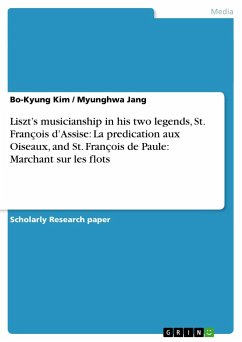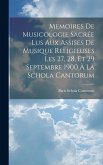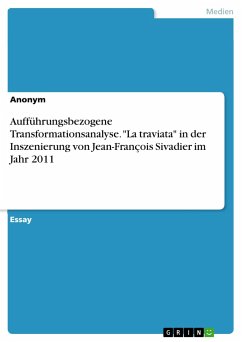Research Paper (undergraduate) from the year 2013 in the subject Musicology - Miscellaneous, The University of Malaya, language: English, abstract: Franz Liszt was born in western Hungary on October 22nd 1811 and died at Bayreuth, Germany in July 1886. He was a pianist, a teacher and a composer. He developed several musical ways such as programmatic music, technique and thematic transformation. He traveled most of his life, and composed a number of works about the places that he traveled.He met his first lover, Countess Marie d'Agoult at the end of 1832, and they had three children, Blandine, Cosima and Daniel. Liszt separated from Countess Marie d'Agoult in 1844, and he had met his second beloved one who took a very important role for Liszt's life, Princess Carolyne in 1847. His only son died at age of twenty-one in 1859, and three years later, his elder daughter Blandine died at the age of twenty-six after giving birth to her first child. Liszt's only surviving daughter,Cosima left her husband, Hans von Bülow in order to live with Richard Wagner. These three children are from Countess Marie d'Agoult. Lastly, Princess Carolyne had been trying to obtain a divorce from Prince Nicholas von Sayn-Wittgenstein in order to marry Liszt, but it was denied on the day before their planned wedding day on Liszt's fiftieth birthday, October 22, 1861. He spent most of the time composing religious music, and by this time he began to write some pieces for organ. He stayed at Rome for a long time and spent his elder life. He started a two-year retreat at the Madonna del Rosario, and he completed Two Franciscan Legends, St. François d'Assise: La Predication aux Oiseaux, and St. François de Paule: Marchant sur les flots in 1863. They were dedicated to his only surviving child, Cosima. Liszt had personal relationships with these two saints, and particularly he regarded St. Francis of Paul as his patron. Liszt programmed these two Francis Legends as followed ideas. These programmatic works are liked of symphonic poem in piano. The first Legend, St. François d'Assise: La Prédication aux Oiseaux (St. Francis of Assisi: The Sermon to the Birds) was inspired by the moment that the thousands of birds were easing in the cloud above the Monte Mario. The second Legend carries another miracle story: Among the many miracles of St. Francis of Paula the legend celebrated is the one which he performed crossing the Straits of Messina. The ferrymen refused to rent their boat to a person of such humble appearance; he ignored them and walked on the sea with assured step.
Hinweis: Dieser Artikel kann nur an eine deutsche Lieferadresse ausgeliefert werden.
Hinweis: Dieser Artikel kann nur an eine deutsche Lieferadresse ausgeliefert werden.








